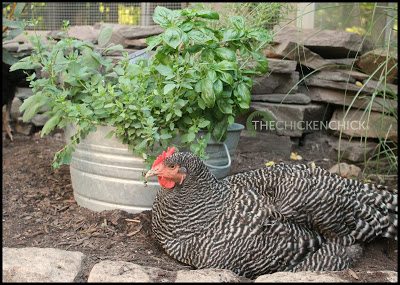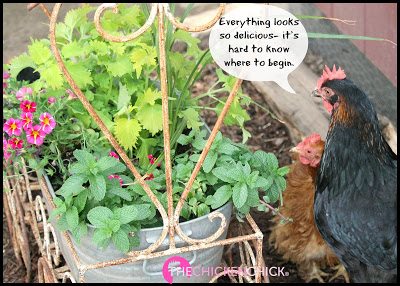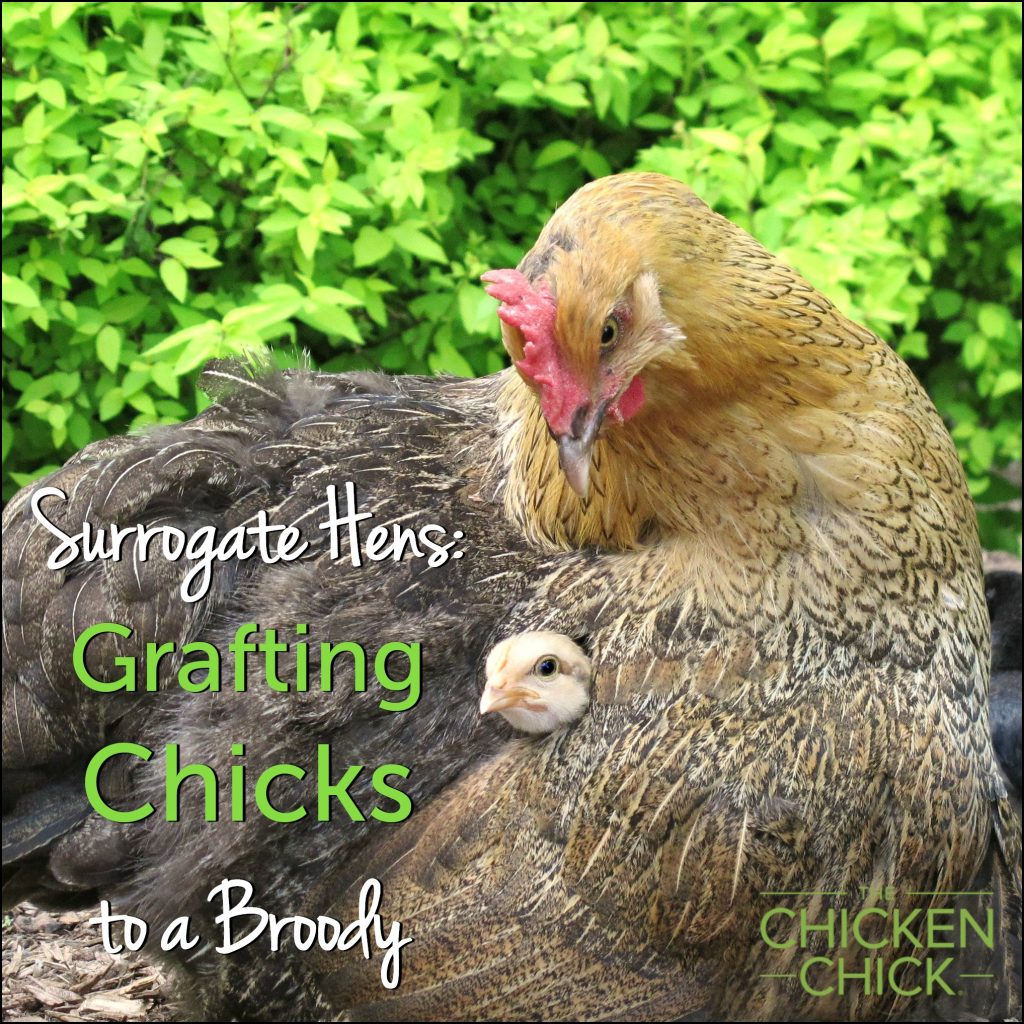No shortage of articles circulate online about using mint with backyard chickens, but how much faith should you place in those claims when the health of your pet chickens is at stake? Let’s take a critical look at the most common claims made about mint to see what they look like when held up to the light.

DOES MINT HAVE A COOLING EFFECT ON CHICKENS?
The Claim is that mint has a cooling effect on chickens in hot weather. The Truth is mint does not have a cooling effect on chickens in hot weather.
While we think of mint as refreshing in hot weather due to its flavor and mouth-feel, mint does not have magical cooling properties, nor a cooling effect on a chicken’s body temperature. Chickens probably don’t even perceive the minty “cool” flavor due to their extremely limited taste buds. Compared to a human’s nearly 10,000 taste buds, chickens have a mere 250! My chickens tend to leave mint and other herbs alone in my chicken yard and while there’s certainly no harm in growing mint in the chicken yard, mint does not lower a chicken’s body temperature. Help chickens beat the heat with proven methods in this article.

DOES FRESH OR DRIED MINT REPEL INSECTS?
The Claim is…mint repels insects from the chicken coop or yard. The Truth is…mint does not repel insects.
While planting herbs around the coop makes for lovely landscaping that chickens are not likely to eat, herbs such as mint, lavender, and rosemary do not repel flies, mites or lice simply by growing near a chicken coop. If a mint garden could repel flies, every horse barn, commercial poultry house, and livestock yard in the world would have herbs growing around it! You won’t find fields of peppermint surrounding dairy farms or horse barns because fresh and dried herbs are not effective insect repellents.
DOES FRESH OR DRIED MINT REPEL RODENTS?
The Claim is…mint deters rodents from the chicken yard. The Truth is…mint does not deter rodents.
While some essential oils such as balsam fir or peppermint, in very high concentrations might repel some rodents if the strong scent sufficiently interferes with their ability to smell danger, a very determined rodent will not be deterred by mint oils. However, it is unsafe to use essential oils around chickens at all because ingestion can be toxic, if not fatal. Mint planted around or placed inside the chicken coop does not discourage rodents because the scent is not strong enough to offend or alarm them.
Herbalist Susan Burek performed an experiment on the effect of mint on rodents in her chicken coop by placing mint around a known mouse nest; the results were fascinating. See the YouTube video where the mother mouse lined the nest for her babies with the fresh mint leaves!
DOES FRESH OR DRIED MINT ADDED TO CHICKEN FEED SUPPORT A HEALTHY IMMUNE SYSTEM?
The Claim is…mint added to chicken feed daily supports a chicken’s immune system. The Truth is…mint added to chicken feed daily can be detrimental to hen health.
Poultry herbalist Susan Burek says, “I do not give herbs to my chickens every day. The misuse of herbs can cause those herbs to act indiscriminately and destructively, much like antibiotics. If you believe any herb has medicinal properties, you know that more often than not, the benefits relate to the effects of essential oils, not fresh or dried herbs. A credible herbalist will not recommend the use of any herb daily or indefinitely in a medicinal capacity. Medicine is not offered to healthy chickens. The daily use of herbs is limited to rebuilding core health of sick chickens and is discontinued either when core health is restored, when an infrequent maintenance level is indicated, or when the herb fails to work for the intended purpose, signaling the need to explore at a different health regimen.”
For more about the use of herbs with poultry, visit herbalist Susan Burek at her website or Facebook page, Raising Chickens Naturally.

Susan Burek, herbalist
28 years herbal study and training
17 years developing poultry-specific herbal protocols
17 years raising and breeding chickens, guinea fowl, peafowl and ducks
Poultry magazine contributor on healthcare topics since 2008
Blue Moon forum advising herbalist 2008-2011
Guinea Fowl Breeders Association Advising Herbalist 2006-2008
Guinea Fowl Breeders Association Board Member 2003-2008
Guinea Fowl Breeders Association Member 2001-2008
Join Susan on Facebook at Raising Chickens Naturally

Sources and further reading:
Why Does Mint Make Your Mouth Feel Cold?
Kathy Shea Mormino
Affectionately known internationally as The Chicken Chick®, Kathy Shea Mormino shares a fun-loving, informative style to raising backyard chickens. …Read on


shop my SPONSORS
No shortage of articles circulate online about using mint with backyard chickens, but how much faith should you place in those claims when the health of your pet chickens is at stake? Let’s take a critical look at the most common claims made about mint to see what they look like when held up to the light.

DOES MINT HAVE A COOLING EFFECT ON CHICKENS?
The Claim is that mint has a cooling effect on chickens in hot weather. The Truth is mint does not have a cooling effect on chickens in hot weather.
While we think of mint as refreshing in hot weather due to its flavor and mouth-feel, mint does not have magical cooling properties, nor a cooling effect on a chicken’s body temperature. Chickens probably don’t even perceive the minty “cool” flavor due to their extremely limited taste buds. Compared to a human’s nearly 10,000 taste buds, chickens have a mere 250! My chickens tend to leave mint and other herbs alone in my chicken yard and while there’s certainly no harm in growing mint in the chicken yard, mint does not lower a chicken’s body temperature. Help chickens beat the heat with proven methods in this article.

DOES FRESH OR DRIED MINT REPEL INSECTS?
The Claim is…mint repels insects from the chicken coop or yard. The Truth is…mint does not repel insects.
While planting herbs around the coop makes for lovely landscaping that chickens are not likely to eat, herbs such as mint, lavender, and rosemary do not repel flies, mites or lice simply by growing near a chicken coop. If a mint garden could repel flies, every horse barn, commercial poultry house, and livestock yard in the world would have herbs growing around it! You won’t find fields of peppermint surrounding dairy farms or horse barns because fresh and dried herbs are not effective insect repellents.
DOES FRESH OR DRIED MINT REPEL RODENTS?
The Claim is…mint deters rodents from the chicken yard. The Truth is…mint does not deter rodents.
While some essential oils such as balsam fir or peppermint, in very high concentrations might repel some rodents if the strong scent sufficiently interferes with their ability to smell danger, a very determined rodent will not be deterred by mint oils. However, it is unsafe to use essential oils around chickens at all because ingestion can be toxic, if not fatal. Mint planted around or placed inside the chicken coop does not discourage rodents because the scent is not strong enough to offend or alarm them.
Herbalist Susan Burek performed an experiment on the effect of mint on rodents in her chicken coop by placing mint around a known mouse nest; the results were fascinating. See the YouTube video where the mother mouse lined the nest for her babies with the fresh mint leaves!
DOES FRESH OR DRIED MINT ADDED TO CHICKEN FEED SUPPORT A HEALTHY IMMUNE SYSTEM?
The Claim is…mint added to chicken feed daily supports a chicken’s immune system. The Truth is…mint added to chicken feed daily can be detrimental to hen health.
Poultry herbalist Susan Burek says, “I do not give herbs to my chickens every day. The misuse of herbs can cause those herbs to act indiscriminately and destructively, much like antibiotics. If you believe any herb has medicinal properties, you know that more often than not, the benefits relate to the effects of essential oils, not fresh or dried herbs. A credible herbalist will not recommend the use of any herb daily or indefinitely in a medicinal capacity. Medicine is not offered to healthy chickens. The daily use of herbs is limited to rebuilding core health of sick chickens and is discontinued either when core health is restored, when an infrequent maintenance level is indicated, or when the herb fails to work for the intended purpose, signaling the need to explore at a different health regimen.”
For more about the use of herbs with poultry, visit herbalist Susan Burek at her website or Facebook page, Raising Chickens Naturally.

Susan Burek, herbalist
28 years herbal study and training
17 years developing poultry-specific herbal protocols
17 years raising and breeding chickens, guinea fowl, peafowl and ducks
Poultry magazine contributor on healthcare topics since 2008
Blue Moon forum advising herbalist 2008-2011
Guinea Fowl Breeders Association Advising Herbalist 2006-2008
Guinea Fowl Breeders Association Board Member 2003-2008
Guinea Fowl Breeders Association Member 2001-2008
Join Susan on Facebook at Raising Chickens Naturally

Sources and further reading:
Why Does Mint Make Your Mouth Feel Cold?





























Awesome you get an opportunity to do these giveaways.
I need this for sure
This would be the best! ?
Would love to win this for the girls!
I would love to win this to protect my ladies!